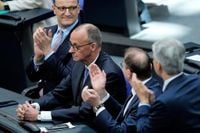On May 6, 2025, Friedrich Merz faced a historic setback when he failed to secure the necessary votes to become Germany's Chancellor in the Bundestag's first voting round. Merz, the leader of the Christian Democratic Union (CDU), received only 310 votes, falling short of the required 316 votes for an absolute majority in the 630-member parliament. This unprecedented failure to achieve the necessary support on the first ballot has plunged the newly formed black-green coalition into its first major crisis.
Bundestag President Julia Klöckner announced, "The MP Friedrich Merz has not reached the required majority of at least 316 votes," marking a significant moment in German political history, as no other candidate for Chancellor had ever failed to win on the first attempt since World War II. The implications of this vote extend beyond Merz's immediate ambitions, affecting the planned appointments of ministers who were set to take over various federal ministries that day.
Among those awaiting their new roles was Bärbel Bas, who was expected to succeed Hubertus Heil as the head of the Federal Ministry of Labor and Social Affairs, a position crucial for disability policy. With the election results now casting uncertainty on the future, the existing ministers will continue to serve in a caretaker capacity until a new Chancellor is elected.
In the hours following the first vote, political leaders and observers were left to speculate about the next steps. The Bundestag has a two-week window to conduct a second election, during which Merz could attempt to secure the necessary support again. If he fails a second time, the constitution allows for the president to appoint a candidate with the most votes or dissolve the Bundestag for a new election.
As the political landscape shifted, outgoing Chancellor Olaf Scholz, leader of the Social Democrats, who lost the national election in February, watched closely. The Social Democrats, along with the CDU/CSU coalition, should have commanded a majority of 328 votes, but the failure to secure the necessary support raised questions about the coalition's stability.
In a dramatic turn of events, Merz was re-elected in a second round later that same day, securing 325 votes. The swift turnaround was a relief for his supporters, who had feared that a second failure could lead to a significant political crisis. Jens Spahn, head of the Union bloc in parliament, stated, "The whole of Europe, perhaps even the whole world, is watching this second round of elections," underlining the importance of Germany's political stability not just for the nation but for the European Union as a whole.
Ukraine's President Volodymyr Zelenskyy expressed hope for increased European leadership from Germany following Merz's victory. He stated, "Ukraine is deeply grateful for the support of Germany and its people. Your helping hand has saved thousands and thousands of Ukrainian lives. We sincerely hope that Germany will grow even stronger and that we’ll see more German leadership in European and transatlantic affairs.” This sentiment reflects the critical role Germany plays in European security, particularly in light of the ongoing conflict in Ukraine.
Germany's military aid to Ukraine has made it the second-largest supplier of such assistance after the United States. This commitment is part of a broader strategy, as Germany has become the fourth-largest defense spender globally, significantly increasing its military budget in response to rising geopolitical tensions.
Merz's coalition government, comprising the CDU/CSU and the Social Democrats, is now tasked with addressing several pressing challenges, including economic stagnation, rising far-right sentiments, and migration policies. Germany's economy has faced contraction over the past two years, with forecasts predicting zero growth in the current year. The coalition is expected to push for economic reforms, including tax cuts and infrastructure investments, to stimulate growth and restore confidence.
The rise of the Alternative for Germany (AfD), the largest opposition party following the February elections, further complicates the political landscape. AfD leader Alice Weidel criticized Merz's initial failure, suggesting it demonstrated a "weak foundation" for his coalition. Despite significant electoral gains, the AfD remains excluded from coalition discussions due to a longstanding policy among mainstream parties to avoid collaboration with far-right groups.
As the dust settles from the day's events, the political dynamics in Germany remain fluid. The CDU/CSU and Social Democrats must navigate their coalition carefully, especially with the AfD's growing presence in parliament. The next few weeks will be pivotal in determining not only Merz's leadership but also the direction of German policy on key issues such as defense, immigration, and economic recovery.
In summary, Friedrich Merz's journey to the chancellorship has been marked by unexpected challenges and a dramatic turnaround. With the new government now in place, all eyes will be on how effectively it can govern amid a backdrop of economic uncertainty and political fragmentation.






